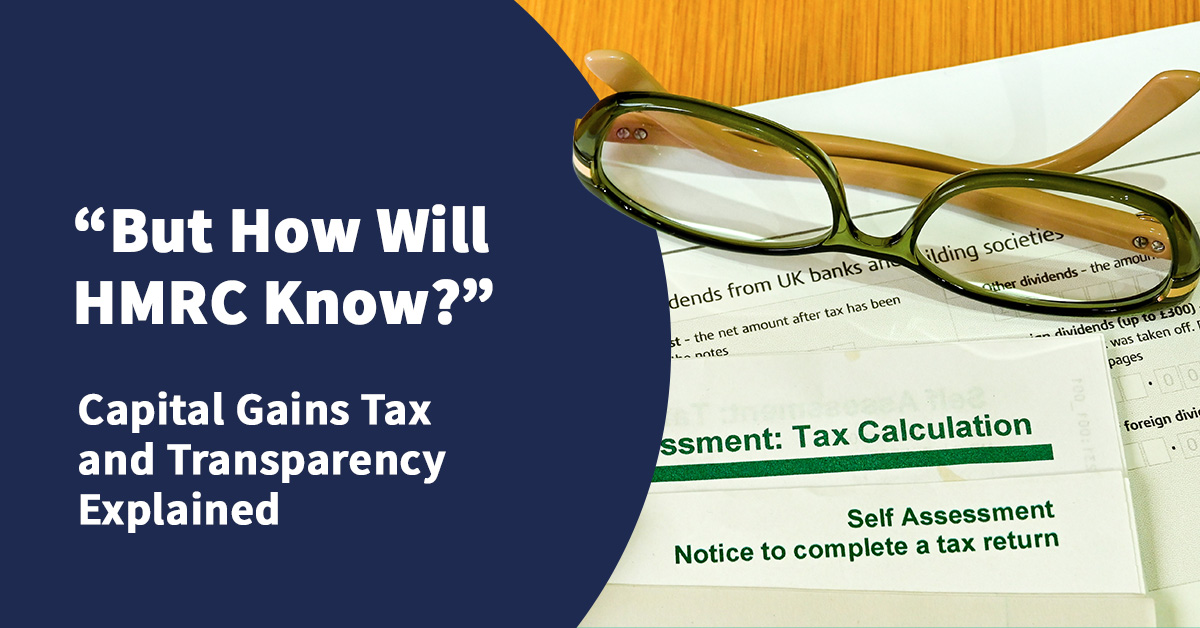One of the most common questions I hear when discussing Capital Gains Tax (CGT) is:
“If I sell shares or an investment in the UK, or I’m UK resident and sell an asset overseas – how will HMRC even know?”
It’s an understandable question. But in today’s world of automatic data exchange, statutory data‑gathering powers, and digital analytics, HMRC has more visibility than ever. Here’s a plain‑English overview you can trust.
1) UK platforms, banks and card processors: what HMRC can see
HMRC can compel UK financial institutions and other ‘relevant data‑holders’ to provide bulk data using Schedule 23 of the Finance Act 2011. This allows HMRC to obtain transaction data from banks, investment platforms and payment providers when needed. In practice, HMRC runs periodic bulk data requests and matches what it receives against Self Assessment returns using its analytics systems.
2) International data sharing (the OECD Common Reporting Standard)
If you’re UK‑resident with money or investments held overseas, your account information is usually sent to HMRC under the OECD’s Common Reporting Standard (CRS). Participating jurisdictions (100+ countries) require financial institutions to report account holder details, year‑end balances, income such as interest and dividends, and—importantly for CGT—gross proceeds from sales/redemptions in custodial accounts. HMRC then reconciles those data with UK tax returns and can enquire where figures don’t line up.
3) Property disposals: Land Registry and the 60‑day report
For UK residential property, sellers must report and pay any CGT due within 60 days of completion. HMRC also receives data direct from UK Land Registry, so sales are on their radar. Non‑residents disposing of UK residential property are subject to the same 60‑day report.
4) HMRC “Connect”: the data‑matching engine
HMRC’s Connect system cross‑references billions of lines of data, from tax returns and Land Registry to third‑party financial datasets, to spot discrepancies. Government documents confirm Connect is being actively upgraded, and HMRC itself says it uses the tool to identify hundreds of thousands of potential enquiry cases each year.
5) Bank transfers and money movements
Large or unusual money movements (for example, proceeds from an overseas sale later moved into the UK) don’t prove a tax issue by themselves, but HMRC can request supporting information from banks and platforms and then match this with CRS data and returns via Connect.
6) How far back can HMRC go, and what are the penalties?
Time limits depend on behaviour and whether the matter is offshore:
• 4 years: where you took reasonable care.
• 6 years: where the error was careless.
• 12 years: many offshore matters or offshore transfers (for 2015–16 onwards).
• 20 years: deliberate behaviour (and certain failures to notify).
For offshore non‑compliance under the ‘Requirement to Correct’ regime, HMRC factsheets confirm penalty ranges up to 200% of the tax due, with interest on top. This is why “hoping it slips under the radar” is a very poor strategy.
Planning beats guessing
Rather than asking “How will HMRC know?”, the better question is: “How can I plan disposals efficiently so I don’t pay more tax than necessary?” With the right timing, use of allowances, and tax‑efficient wrappers, you can keep more of your gains while staying fully compliant.
If you’d like a personalised plan, get in touch and we’ll map it out.
Let’s start the conversation
Online enquiry form
Related posts
 Published On: November 10, 2025|5.3 min read|
Published On: November 10, 2025|5.3 min read|How to Choose the Right Financial Adviser Before Moving Abroad (UK Residents Planning to Relocate)
If you’re planning to relocate abroad, find out how a UK-qualified financial adviser can help you prepare. Learn about tax residency, Double Taxation Agreements (DTAs), the Statutory Residence Test (SRT), offshore accounts, and how to structure assets before you leave.
Read more
 Published On: November 7, 2025|6 min read|
Published On: November 7, 2025|6 min read|Should You Sell or Keep Your UK Property When Moving Abroad?
For many people leaving the UK, one of the biggest decisions isn’t what to pack, it’s what to do with the family home or investment property. Should you sell before you leave, or keep it and rent it out while you live abroad?
Read more
 Published On: November 5, 2025|4.8 min read|
Published On: November 5, 2025|4.8 min read|Digital Nomad? Yes. Tax Nomad? No.
Digital nomads can work anywhere, but tax rules still follow. Discover why you can’t be a “tax nomad” and how to plan your residency correctly.
Read more















